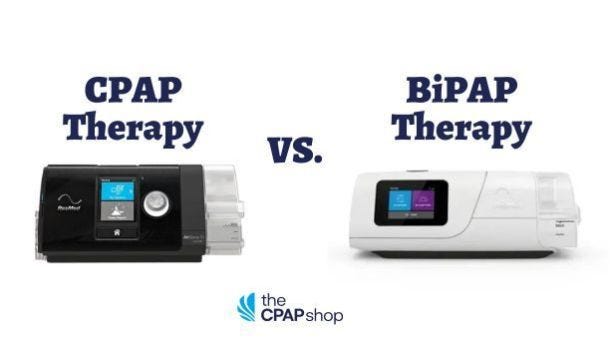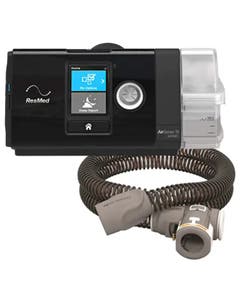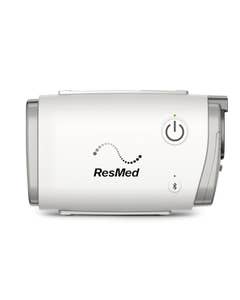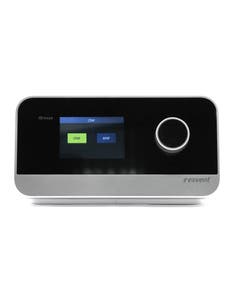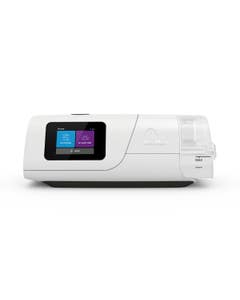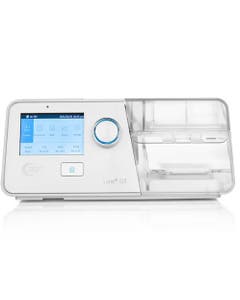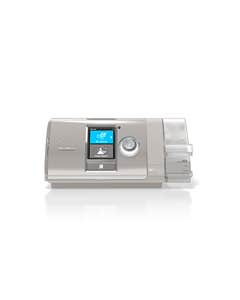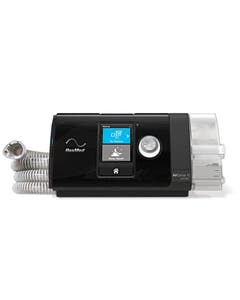What is the Difference Between CPAP and BiPAP Therapy?
CPAP therapy and BiPAP therapy both apply to sleep apnea patients. Here are the similarities and differences between both types of therapy and the machines you may have to use.
What is CPAP?
CPAP stands for continuous positive airway pressure. Sleep apnea patients have a tendency for their airways to close, leading to disruptive and unhealthy sleep patterns. This treatment for sleep apnea uses mild air pressure to keep your airways open while you sleep.
What is BiPAP?
For some patients, mild air pressure isn’t enough. BiPAP or bilevel positive airway pressure delivers pressurized air both during inhalation and exhalation, regulating settings prescribed by your sleep doctor. BiPAP is used for more severe sleep apnea cases, other health conditions, or for sleep apnea patients who have been unsuccessful with CPAP.
What are the Similarities Between CPAP vs BiPAP?
Both CPAP and BiPAP therapies use pressurized air to treat sleep apnea. They both therapies use machines with a hose and mask to deliver that pressurized air. Both CPAP machines and BiPAP machines are available with humidifiers. Both machines are also available in portable versions.
What Health Conditions do CPAP and BiPAP Treat?
CPAP therapy is focused entirely on managing sleep apnea. BiPAP therapy is also used for patients with congestive heart failure, coronary artery disease, and pulmonary lung disease like COPD. With regulated pressures for both breathing in and out, BiPAP becomes helpful for patients with low oxygen levels.
What is the Difference Between BiPAP and CPAP?
CPAP machines deliver pressurized air through the nostrils into the back of the throat to maintain an open airway while you sleep. While the air pressure is adjustable, the CPAP machine is delivering only one flow of air.
BiPAP machines deliver two levels of air pressure, inhalation positive airway pressure (IPAP) and exhalation positive airway pressure (EPAP). These two adjustable pressure settings provide a more regulated control of airflow for patients.
| CPAP Pros | BiPAP Pros |
| Preferred treatment for mild sleep apnea | Preferred treatment for other health conditions that impact breathing |
| Works with most sleep apnea patients | Improves exhalation |
| Available in a variety of machines | Offers more refined air pressure flow adjustment |
| CPAP cons | BiPAP cons |
| Doesn’t work for all sleep apnea patients | More expensive than CPAP |
| Sometimes comes with discomfort of the nose and throat | May take more time to adjust to two pressure settings over one |
| Limited to single air pressure setting | May experience same discomfort of nose and throat like CPAP |
Which is Better: CPAP or BiPAP and Why?
There are many factors that can determine which type of machine will be better for you. It is important you first consult with your doctor so they can give you an accurate diagnosis of how severe your sleep apnea is.
Although the type of therapy you end up using depends on your personal health needs as recommended by your doctor, your personal comfort matters too. If you are struggling to adjust to CPAP, BiPAP may be the ideal alternative for a more restful sleep. The most important thing is to prioritize getting the best therapy necessary for a successful night's sleep and better health overall.
How Much Does CPAP or BiPAP Cost?
CPAP is less expensive with CPAP machines ranging from $385 to $849. If BiPAP therapy is required, you will pay more with BiPAP machines running from $1,700 to $3,500.
Ask Your Doctor About the Benefits of BiPAP and CPAP
Ultimately, your doctor’s recommendations will decide which therapy you need most. The experts at The CPAP Shop can help you find the right machine, whether CPAP or BiPAP, to fit your prescription. You can also speak directly to one of our expert customer service agents but calling us at 866-414-9700.
CPAP therapy and BiPAP therapy both apply to sleep apnea patients. Here are the similarities and differences between both types of therapy and the machines you may have to use.
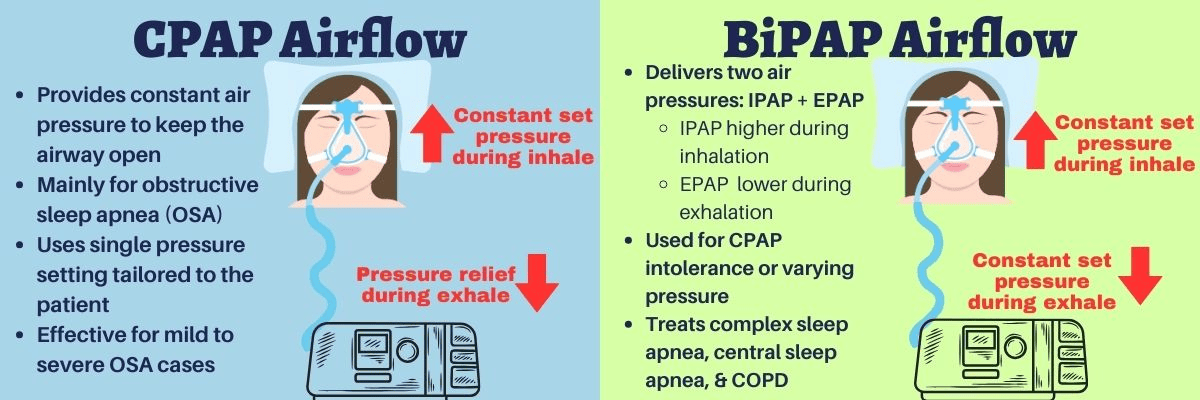
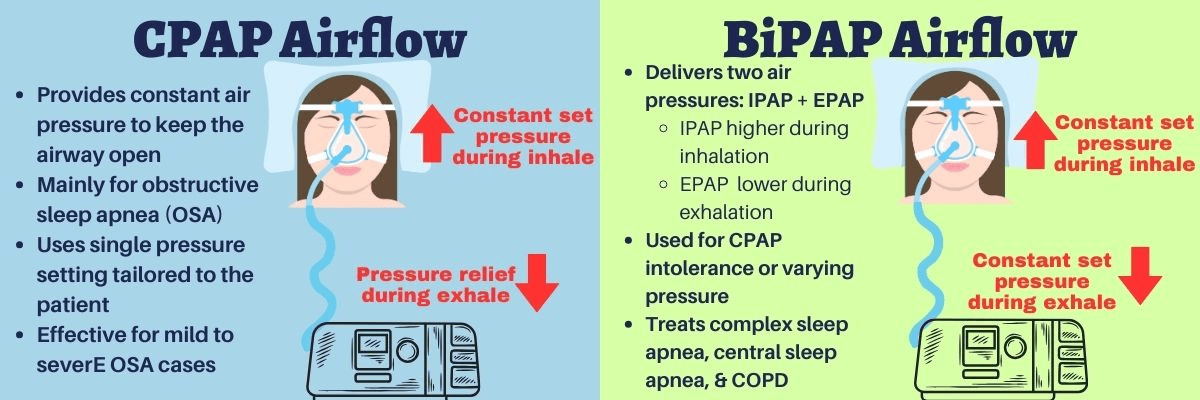
What is CPAP?
Sleep apnea patients tend for their airways to close, leading to disruptive and unhealthy sleep patterns. CPAP stands for continuous positive airway pressure. A CPAP Machine delivers a constant flow of pressurized air, that is set/prescribed by your healthcare provider, while you are asleep to keep your airway open. It is mainly used as a treatment method for people who have obstructive sleep apnea (OSA). The pressure is only delivered while you inhale so that you can exhale normally, provided via a CPAP mask.
The pressure setting prescribed by your doctor will be tailored to you based on a number of your unique needs, such as weight, gender, and symptoms. An effective pressure setting will reduce sleep apnea symptoms like snoring and headaches, reduce the number of apnea episodes you have at night, and improve other sleep apnea symptoms like mood, daytime fatigue, and more.
What is BiPAP?
For some patients, mild air pressure isn’t enough to relieve sleep apnea symptoms. BiPAP or bilevel positive airway pressure delivers pressurized air both during inhalation and exhalation, regulating settings prescribed by your sleep doctor. BiPAP is used for more severe sleep apnea cases, other health conditions, or for sleep apnea patients who have been unsuccessful with CPAP.
The purpose of the two pressure settings is to help sleep apnea patients breathe easier at night to avoid or reduce apnea episodes while they are asleep. The pressure as you inhale will be a higher setting than the pressure you exhale with and is delivered via a mask.
What are the Similarities Between CPAP vs BiPAP?
Both CPAP and BiPAP therapies use pressurized air to treat the various forms of sleep apnea. Both types of therapy use machines with a hose and mask to deliver that pressurized air. Both CPAP machines and BiPAP machines are available with humidifiers that add moisture to the air, which makes breathing more comfortable without irritation from a dry airway. Both machines are also available in portable versions that are smaller in size and can be used when traveling or on the go.
What Health Conditions do CPAP and BiPAP Treat?
CPAP therapy is focused entirely on managing sleep apnea. BiPAP therapy is also used for patients with congestive heart failure, coronary artery disease, and pulmonary lung disease like COPD. With regulated pressures for both breathing in and out, BiPAP becomes helpful for patients with low oxygen levels.
What is the Difference Between BiPAP and CPAP?
CPAP machines deliver pressurized air through the nostrils into the back of the throat to maintain an open airway while you sleep. While the air pressure is adjustable, the CPAP machine delivers only one flow of air. Although CPAP machines only have one pressure setting, most new machines are equipped with technology that provides pressure relief and gentler air pressure as you exhale for a more comfortable breathing experience.
BiPAP machines deliver two levels of air pressure, inhalation positive airway pressure (IPAP) and exhalation positive airway pressure (EPAP). These two adjustable pressure settings provide a more regulated control of airflow for patients. The separate pressures may be timed automatically based on a patient's breathing pattern.
|
CPAP Pros |
BiPAP Pros |
| Preferred treatment for mild sleep apnea | Preferred Treatment for other health conditions the impact of breathing |
| Works with most sleep apnea patients | Improves exhalation |
| Available in a variety of machines | Offers more refined air pressure flow adjustment |
| CPAP Cons | BiPAP Cons |
| Doesn't work for all sleep apnea patients | More expensive than CPAP |
| Sometimes comes with discomfort in the nose and throat | May take time to adjust to two pressure settings over one |
| Limited to single air pressure setting | May experience the same discomfort in nose and throat like CPAP |
Which is Better: CPAP or BiPAP and Why?
There are many factors that can determine which type of machine will be better for you. It is important you first consult with your doctor so they can give you an accurate diagnosis of how severe your sleep apnea is.
Although the type of therapy you end up using depends on your personal health needs as recommended by your doctor, your personal comfort matters too. If you are struggling to adjust to CPAP, BiPAP may be the ideal alternative for a more restful sleep. The most important thing is to prioritize getting the best therapy necessary for a successful night's sleep and better health overall.
How Much Does CPAP or BiPAP Cost?
CPAP is less expensive with CPAP machines ranging from $385 to $849. If BiPAP therapy is required, you will pay more with BiPAP machines running from $1,700 to $3,500.
Ask Your Doctor About the Benefits of BiPAP and CPAP
Ultimately, your doctor’s recommendations will decide which therapy you need most. The experts at The CPAP Shop can help you find the right machine, whether CPAP or BiPAP, to fit your prescription. You can also speak directly to one of our expert customer service agents but calling us at 866-414-9700.



